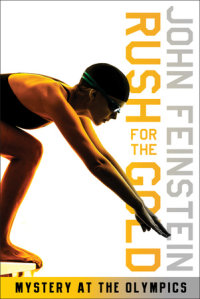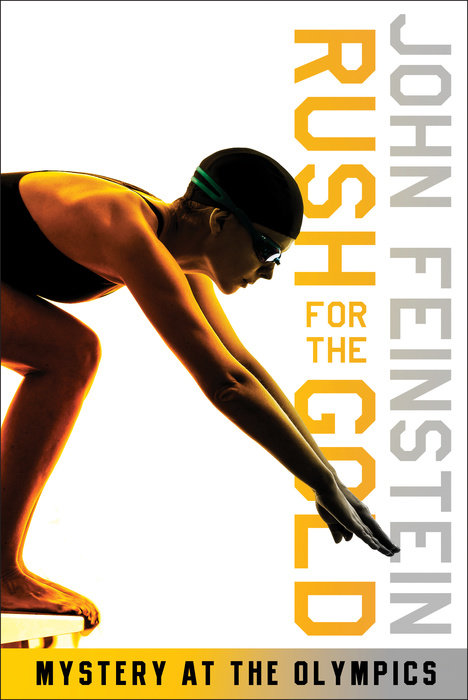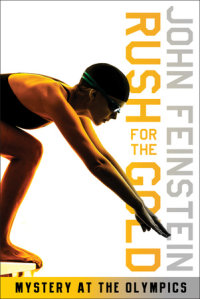1: THE MAKING OF A CHAMPION
From somewhere off in the distance, Susan Carol Anderson thought she heard her father’s voice, which wasn’t possible because her head was underwater and she was searching for one last spark of energy to close the ten-meter gap between her and the wall. And yet, even though she knew she couldn’t possibly hear his voice this clearly, there it was again.
“Susan Carol, sweetheart; are you listening?”
She was in lane six in a swimming pool in Shanghai, China, and yet she kept hearing her dad’s voice, almost as if they were back home in Goldsboro, North Carolina, sitting in their living room.
“Susan Carol, snap out of it.”
That’s when it hit her. She was sitting in her living room in Goldsboro. Shanghai was thousands of miles away and nine months in her past. She had drifted off into her own safe little world in the pool while her dad was talking to the three people seated across from her.
And now her father was looking at her expectantly, which was a problem since she had no idea what he was expecting. Finally, the man seated directly across from her, whose name she remembered was Jeffrey Paul Scott--“call me J.P.,” he had said, walking in the door--gave her a clue.
“You don’t have to decide anything now, Susan Carol,” he was saying in a soothing voice. “We just want you and your dad to have an idea of where this could all go. We aren’t in the business of trying to pitch fantasies; we try to tell people what to expect realistically. In your case, the sky’s the limit, but even if you don’t hit the sky, the bar is pretty high.”
Susan Carol nodded because that felt like it was the right thing to do. She looked back at the coffee table and all the brightly colored folders that J.P. and his two partners--William Arnold (she was to call him Bill) and Susie McArthur--had laid out in front of them. One was labeled Swimming Sponsors, another said Beauty Sponsors, a third said Teen Sponsors, and a fourth said modestly How Lightning Fast Will Make Susan Carol Anderson a Star.
Maybe it was that one that had sent her spinning back in time to that amazing week in Shanghai last summer. She had gone to China hoping to swim the meet of her life. She never dreamed that succeeding would completely change her life.
Her father was talking again. “Susan Carol, I think J.P., Bill, and Susie understand that this is a lot for a fifteen-year-old to digest in one evening,” he said. “Actually, it’s a lot for a forty-six-year-old to digest in one evening.”
As if on cue, J.P., Bill, and Susie laughed as though her father was David Letterman and Jimmy Kimmel rolled into one.
“Your dad’s right,” Susie said. “All we really want to know is if any of this makes sense to you, and if not, what would make sense to you. Our job is to make sure you’re comfortable with all this.”
In that case, Susan Carol thought, please take your folders, and let me go back to being a fifteen-year-old girl who loves to swim and loves to be a sportswriter. She thought of something one of her heroes, Duke basketball coach Mike Krzyzewski, had said: “When you’re growing up, you train to be an athlete. Then you train to be a coach. But you never train to be a celebrity.”
She hadn’t trained to be a celebrity and, having had brushes with it in the past, had no real interest in it. But the dollar figures that the Lightning Fast trio had been throwing around were stunning. Even her father, who had some experience in the world of professional athletes, had been wide-eyed. Speedo was willing to guarantee $1 million for the first year, including a $500,000 signing bonus, with another four years open to negotiation depending on how she did in London. That didn’t include any of the performance bonuses written into the contract. Nike was interested and so was Dove. Not to mention Under Armour, the Disney Channel, and--this one she knew would make Stevie Thomas, her closest friend, gag--Seventeen magazine.
The Andersons weren’t poor by any means. Susan Carol’s dad made a solid living as a minister at the local Episcopal church, and her mother made decent money teaching freshman English at Goldsboro High School. But being the second of four children, all of whom were absolutely going to college if their parents had their way, Susan Carol knew that every added dollar helped. Now the Lightning Fast people were sitting in front of them saying that she could sign her name to a piece of paper and take care of all four kids’ college tuitions--and perhaps a lot more.
“I’m a little overwhelmed,” she finally said when it felt as if everyone in the room had been staring at her for hours. “I mean, this is incredible, what you’re talking about. It just sounds too good to be true.”
“But it is true,” J.P. said. “This is what these companies think about you and your potential. These are just starting points we’re talking about right now because we don’t want to get ahead of ourselves. If London goes well, that’s when that sky-high scenario kicks in.”
London, Susan Carol thought. My God, the London Olympics are less than five months away. The trials are less than--she almost gasped out loud at the thought--fifteen weeks away! How could all of this be happening so fast? A year ago the idea of making a national team was a fantasy. Now all this. The grown-ups were talking again--bonuses, roll-over deals, options. Her mind retreated to the pool; no, actually she was back a bit further in time. . . .
It had been at a Grand Prix meet in Charlotte that she had gone from being a solid age-group swimmer to a national contender.
She had expected to swim well in Charlotte. In fact, she had been fairly certain she was going to blow past her previous best times. Between the ages of fourteen and fifteen she had filled out and put a good deal more muscle on her body, going from a lean five-eleven and 135 pounds to a rock-solid six feet and 150. She was grateful that she’d only grown another inch but even happier knowing she now had the strength she needed to finish off a 200-meter butterfly.
Even so, she had been stunned when she realized on the final length that she was not only ahead of her longtime nemesis, Becky Ausmus, but was pulling away from her. And she wasn’t dying. Even in her best 200-fly races in the past, her arms felt as if there were weights inside them as she got close to the flags. This time was different. Ten meters out, even though she could feel the pain of her effort from head to toe, she knew she wasn’t going to die, that the proverbial piano was landing on someone else’s back, not hers.
When she hit the wall, she could hear shrieks coming from her teammates. Pushing her goggles up, she glanced at the electronic timing board and gasped in disbelief. The time next to her lane said 2:08.55. She looked around to see if it was possible that anyone else had somehow beaten her and their time had been recorded for her lane. No, that wasn’t it.
She had never gone faster than 2:19.05 for a 200 in her life. She had been hoping with her new size and strength to break 2:15--which would have been huge. This was impossible--a drop of more than ten seconds?
Still gasping, she looked up at her coach, Ed Brennan, who had the widest smile she had ever seen.
“The time?” she managed to say.
Ed held up his stopwatch. “It’s right,” he said. “You beat Ausmus by almost five seconds. You might be going to the Worlds after that swim.”
It turned out he was right. Only one American swimmer, Teresa Crippen, had produced a time faster than hers in the past twelve months. Each country was allowed two swimmers per event in the Worlds, and Susan Carol’s swim in Charlotte qualified her as the second American in the 200 fly. Her 100-fly time in Charlotte, which had dropped almost four seconds from her previous best, didn’t earn a spot at the Worlds but did cause Ed to say something that stopped her cold.
“If you keep going like this, there’s no reason you can’t make the Olympic team in both the 100 and the 200,” he said. “You’re good enough if you really want to do it.”
Prior to Charlotte, Susan Carol’s goal had been to make the Olympic Trials. A trials swim would guarantee she’d be recruited by colleges. And her number one swimming goal had always been to get a college scholarship. Now she’d be going to the Olympic Trials and the World Championships.
The trip to China had been a blur. Susan Carol knew almost nothing about Shanghai and was stunned when she Googled it and found it was almost twice the size of New York City, with a population of 14 million. The pool was an indoor facility--which was good because the temperature was close to ninety almost every day they were there.
Frank Busch, who was coaching the American women, told her she had to conserve her strength in the heats and the semifinals. “You’ll only need to go about 2:12 or 2:13 in the heats,” he said. “Anything under 2:10 should be enough in the semis. You’re going to have to swim the 200 fly three times in three days. I’m guessing you’ve never done that before.”
She’d done it twice in two days on occasion but never three times. Still, she knew she was in the best shape of her life. Ed had made her do a set of five 200s on three minutes’ rest in practice before she’d left. It had hurt--really hurt--but she had felt okay, even after the last one. And sure enough, she cruised through the heats and the semifinals, qualifying fourth with a time of 2:09.12. She was amazed how easy that swim felt. Easy!
Liu Zige, the Chinese world record holder, had gone the fastest time in the semifinals: 2:05.99--well off her world record time of 2:01.81. She was in lane four. Teresa Crippen, the other American, had qualified second and was in lane five. And Susan Carol was next to her in lane six. Susan Carol planned to let Crippen pace her for the first 100 meters so she wouldn’t go out too fast. Crippen was too experienced to make that mistake.
Susan Carol followed that plan for fifty meters. But coming off the first wall, she could see she was already half a body length ahead of Crippen, and she had almost been holding back. She decided to just swim smoothly and not look around at all. She went into the routine she used in practice to try to keep her stroke steady: Nice and easy, she kept repeating with each two-stroke sequence. Nice . . . and easy . . .
At the halfway point, she felt as if she was just starting the race and could go 200 more meters if need be. Crippen was nowhere in sight, but as Susan Carol turned, she glanced over two lanes and saw that she was dead even with Liu. A little bit of fear crept through her. Was her mind fooling her body? Had she gone out too fast?
She could hear the building getting very loud as she and Liu churned through the third length. That wasn’t surprising: Liu was a national hero in China. Sometimes, though, a swimmer can actually hear a tone to the crowd. There is a difference between cheering and pleading. Susan Carol thought the crowd’s tone sounded as if someone was threatening Liu. She knew she wouldn’t see Liu on her last turn because she would turn her head away from her not toward her. That’s not important, she told herself. Holding your stroke and kicking hard for the last fifty is what’s important.
When she came off that final wall, though, she got a shock: As she pulled out of the turn and started to take her first stroke, she saw Crippen go by her heading toward the wall. That meant Susan Carol was at least ten meters ahead of her. Was something wrong with Crippen? Or was it possible that something was incredibly right with her?
Halfway home, she felt her arms start to tighten, but she still had energy left and she picked up her kick. She could now see the flags in front of her and the noise had become impossibly loud. Could she actually be in medal contention? Suddenly she was under the flags that marked five meters to go. She took one last breath, put her head down, and reached for the wall with her last bit of strength, just getting her fingertips on the timing pad without having to add an extra kick.
She surfaced in time to see that Liu was on the wall but others were just touching. Did I finish second? she wondered. Could that be possible? She heard shrieks from where the American team was sitting, and she pulled her goggles up and glanced over to see people jumping up and down and waving their arms. Becky Ausmus, who had made the team as a freestyle relay swimmer, was pointing at the scoreboard.
Susan Carol finally looked: She had gone 2:03.44. Liu had gone 2:03.46.
Crippen had actually rallied in the final length to finish third, way back at 2:05.85. Susan Carol couldn’t believe it.
She had WON the World Championship. The World Championship. Won. It.
Later she would find out that she had put up the second-fastest time any woman had ever gone in the history of US swimming.
Teresa Crippen had called it right then. She was leaning on the lane line, reaching to give Susan Carol a hug. “Do you realize what you’ve just done?” she said. “You’ve just become a star--a big star.”
Nine months later, sitting in her living room, Susan Carol could still hear Crippen’s voice. The question now was a little more complex: Just how big a star did she want to be?


